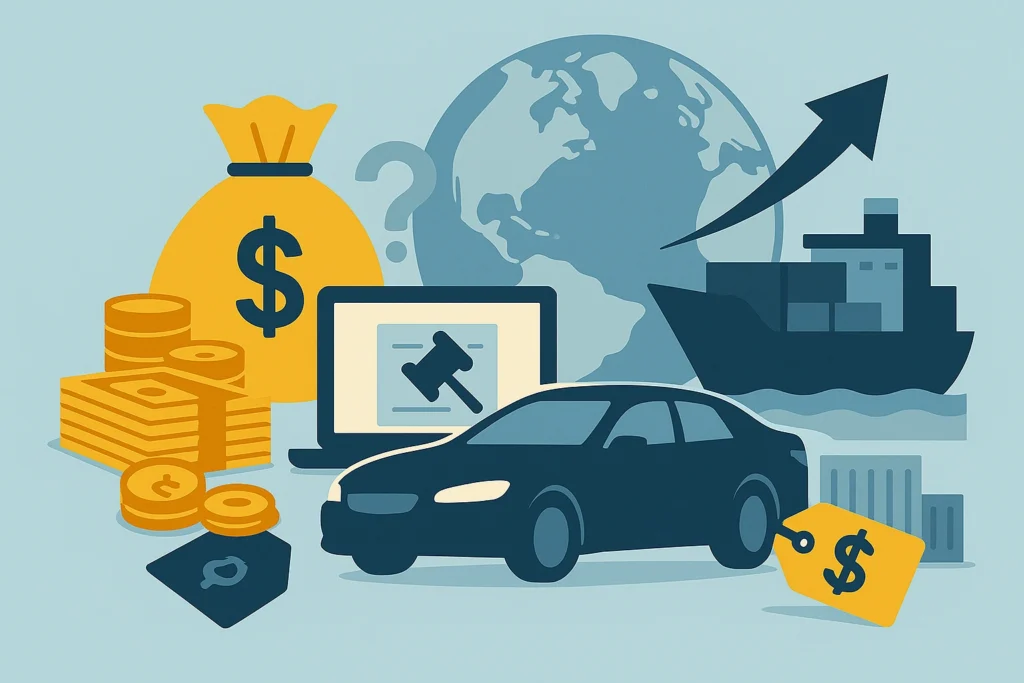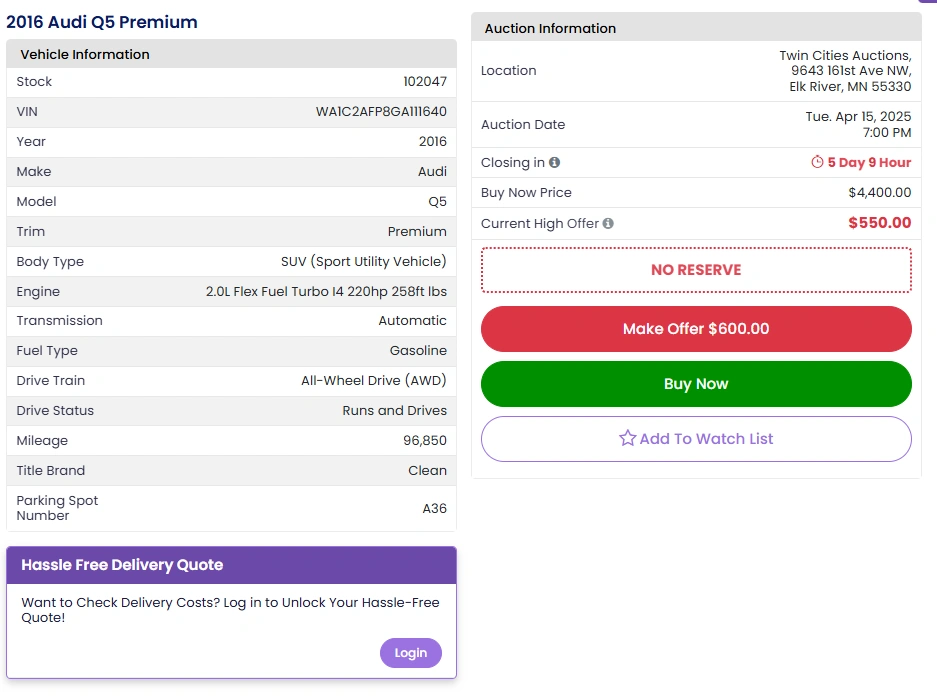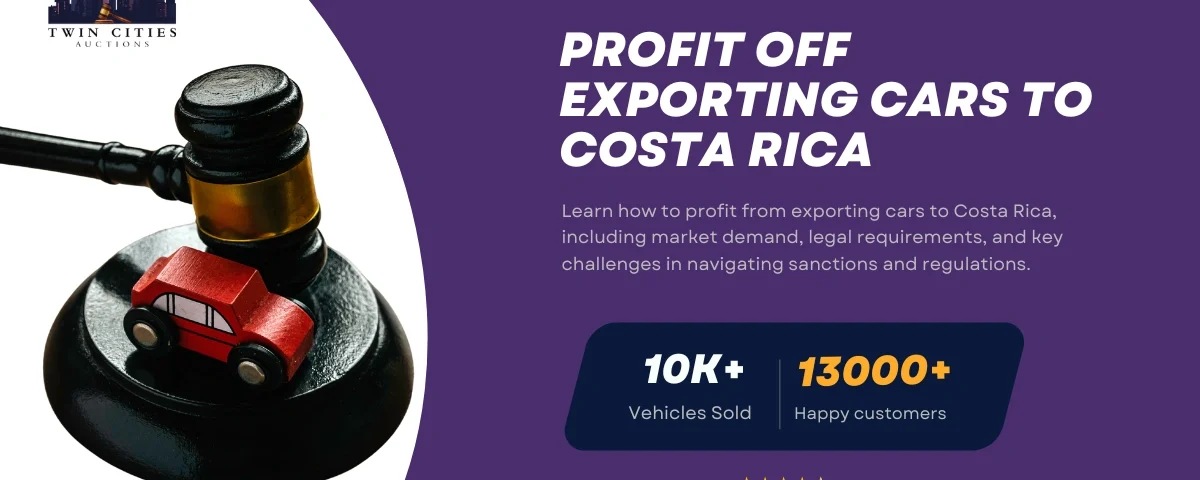In 2023, Costa Rica imported $592 million worth of passenger cars under HS code 8703—a 5.8 % increase from $559.5 million in 2022, according to UN Comtrade. The average CIF import price was $14 800 per unit, per IndexBox.
Strong consumer demand for late-model sedans, SUVs, and light commercials, combined with a stable political environment and robust tourism sector, make Costa Rica an attractive market for U.S. exporters who master its compliance requirements, layered levies, and logistical channels.

Key Takeaways
- 2023 car-import value: $592 M (↑ 5.8 % vs 2022)
- Avg. CIF price: $14 800 per vehicle
- Mandatory docs: Commercial Invoice, Bill of Lading, Customs Declaration, MEIC Conformity Certificate
- Levies: Import Duty 20 %; ICE 10–30 % (by engine size); VAT 13 %
- Build a detailed landed-cost model to protect margins
- Auctions unlock nationwide U.S. sourcing and on-site title verification
Understanding the Costa Rica Market
Costa Rica’s vehicle market continues to grow steadily, with used cars making up a significant portion of imports due to the country’s strong middle-class demand. Buyers typically favor compact sedans, hybrids, and fuel-efficient SUVs that handle the country’s mixed urban and rural roads.
The market’s average CIF price of $14,800 reflects a demand for newer-model vehicles with good resale value. U.S. exporters have a strong foothold, but face competition from Japanese and Mexican suppliers.
| Year | Import Value (USD M) | Change vs Prior Year |
| 2022 | 559.5 | — |
| 2023 | 592.0 | + 5.8 % |
| Metric | Figure |
| Avg. CIF Price per Vehicle | $14 800 per unit |
Regulations & Compliance
Importing cars into Costa Rica involves meeting both customs and technical requirements overseen by the Ministry of Economy, Industry, and Commerce (MEIC).
All vehicles must pass a conformity review to ensure they meet local emissions and safety standards, which often mirror or adapt U.S. and European norms.
Missing documentation, even something as simple as a properly itemized invoice can delay clearance. MEIC certificates can take several business days, so early submission is advised.
| Document | Purpose | Processing Time |
| Commercial Invoice | Declares sale value and trading parties | Immediate |
| Bill of Lading | Proof of sea or air shipment | Immediate |
| Customs Declaration (DA-7 form) | Formal entry and levy assessment | Immediate |
| MEIC Conformity Certificate | Verifies compliance with safety and emissions standards | 3–7 days |
Sources: U.S. Commercial Guide—Costa Rica
Tariffs & Taxes
Costa Rica applies a layered tax structure that significantly impacts the final vehicle cost. The Selective Consumption Tax (ICE) varies widely based on engine size and vehicle category, making accurate classification essential.
Since all taxes are calculated cumulatively, errors in one area can compound your total liability. Understanding how VAT interacts with prior duties is crucial for estimating total costs and pricing competitively in the local market.
| Levy | Rate | Base |
| Import Duty | 20 % | CIF |
| Selective Consumption Tax (ICE) | 10–30 % | CIF + Import Duty |
| Value-Added Tax (VAT) | 13 % | CIF + Import Duty + ICE |
Source: Costa Rican Customs Authority
Crafting Your Landed-Cost Model
A solid landed-cost model not only ensures profitability but also helps you stay compliant with Costa Rica’s complex import tax system. Always include freight and marine insurance in your CIF estimates, as these affect every downstream tax.
Additionally, your desired margin should reflect market competitiveness without pricing out local buyers. Exporters who account for local registration, inspection, and dealer markup gain a clearer picture of consumer-end pricing.
| Component | Calculation |
| CIF Cost | FOB Price + Freight & Marine Insurance |
| Import Duty (20 %) | 0.20 × CIF |
| ICE (10–30 %) | band × (CIF + Import Duty) |
| VAT (13 %) | 0.13 × (CIF + Import Duty + ICE) |
| Total Landed Cost | Sum of above |
| Desired Margin | Typically 10–15 % over landed cost |
Top Supplying Countries (2023)
Costa Rica’s car import market is dominated by Asian manufacturers, with Japan holding over a third of the total share due to the popularity of reliable, fuel-efficient models.
The United States remains a strong second, valued for its wide inventory and familiarity with left-hand drive vehicles.
Mexico and South Korea are also competitive due to proximity and favorable trade terms. Exporters from non-top markets must offer strong pricing or niche models to compete effectively.
| Country | Import Value (USD M) | Share (%) |
| Japan | 210.3 | 35.5 |
| United States | 118.4 | 20.0 |
| Mexico | 75.2 | 12.7 |
| South Korea | 60.1 | 10.1 |
| Germany | 35.8 | 6.1 |
Source: UN Comtrade
Main Shipping Gateways
Puerto Limón is the main hub for containerized vehicle imports and handles the bulk of Costa Rica’s maritime cargo. Its strategic location on the Caribbean coast offers faster access from Gulf and East Coast U.S. ports.
Puerto Caldera on the Pacific side is increasingly used for Ro-Ro shipments and may offer quicker turnaround for certain types of freight.
Exporters should consider port congestion and carrier schedules when choosing a shipping route.
- Puerto Limón: Primary container terminal for vehicle imports
- Puerto Caldera: Expanding Ro-Ro capacity to supplement Limón
Common Pitfalls to Avoid
One of the most common mistakes exporters make is misclassifying vehicles for the ICE tax band, which can trigger penalties or shipment reclassification. Skipping the MEIC certification will almost certainly lead to customs delays or rejection.
Weather-related slowdowns, especially during Costa Rica’s rainy season, can extend port clearance and inland transport times. Additionally, failing to include required Spanish-language labels can stall retail sales and even lead to compliance fines.
| Common Pitfall | Details |
|---|---|
| Misclassifying ICE Rates | Ensure engine displacement is used to determine the correct ICE tax band. |
| Skipping MEIC Certification | The conformity certificate is mandatory for customs clearance. |
| Underestimating Transit Delays | Seasonal weather can slow port operations and impact delivery timelines. |
| Ignoring Spanish Labeling Requirements | Spanish-language labeling is required for vehicle sale and legal compliance. |
Why Auctions Are a Smart Choice for Car Purchases
Auctions can be an excellent source for late-model vehicles with clear chains of title and affordable pricing. Twin Cities Auctions, based in Minnesota, is one such reputable auction house that offers a wide range of vehicles at competitive prices.
Key Benefits of Buying from Auctions:
- Wide Selection: Auctions like Twin Cities Auctions offer a variety of vehicles, from low-budget cars to high-end models.

- Competitive Pricing: Auctions often offer vehicles at prices below retail value, enabling dealers to maximize their profit margins.

- Transparency: Auctions provide full vehicle history reports, so you know exactly what you’re buying.

- Convenient Bidding: Many auctions offer online bidding for your convenience, making it easier to source vehicles without being physically present.
Twin Cities Auctions: A Smart Vehicle Sourcing Choice
For those in the automotive industry, Twin Cities Auctions offers an excellent platform for sourcing quality vehicles at competitive prices.
Whether you are just starting or expanding your business, this auction house provides transparency, competitive pricing, and a broad selection.
| Feature | Description |
| Inventory Variety | Wide range of cars, trucks, and SUVs available |
| Competitive Pricing | Below-market pricing allows for higher profit margins |
| Vehicle History Reports | Detailed history reports for every vehicle |
| Online Bidding | Convenient online bidding options for dealers |
| Financing Options | Financing available to help with inventory purchases |
Conclusion
Costa Rica’s growing car-import market rewards exporters who accurately model landed costs, comply with layered levies and technical standards, and leverage efficient ports.
Transparent auctions like Twin Cities Auctions streamline sourcing and documentation, laying the groundwork for sustained profitability.
Find Your Next Ride Online at Twin Cities Auctions—No Dealer License Required
Searching for your next vehicle? Twin Cities Auctions offers an online, transparent car auction experience that’s accessible to everyone, no dealer license needed. Browse and bid on a diverse selection of quality vehicles from the comfort of your home.
Whether you’re a first-time buyer or an experienced trader, our clear, honest bidding process ensures you can make informed decisions in a supportive environment. Join our next online auction and discover how effortless and enjoyable finding your next car can be with Twin Cities Auctions!
Looking for more options? Explore our comprehensive list of all available car auctions across the United States. Your next deal might be just a click away!
FAQ
What are Costa Rica’s auto import duties?
Import Duty 20 %; ICE 10–30 % by engine size; VAT 13 % on CIF + prior levies.
Can I export used cars to Costa Rica?
Yes; vehicles must meet MEIC conformity standards and local labeling requirements.
How long does customs clearance take?
Typically 3–7 business days once all compliant documents are submitted.
Are there vehicle age restrictions?
No explicit age cap, but ICE rate bands may apply higher on older/larger engines.
How do I handle cargo delays?
Coordinate with your freight forwarder for real-time port status and budget for potential demurrage fees.
Source Links
https://www.indexbox.io/search/passenger-car-price-costa-rica
https://www.trade.gov/country-commercial-guides/costa-rica-import-requirements-and-documentation


